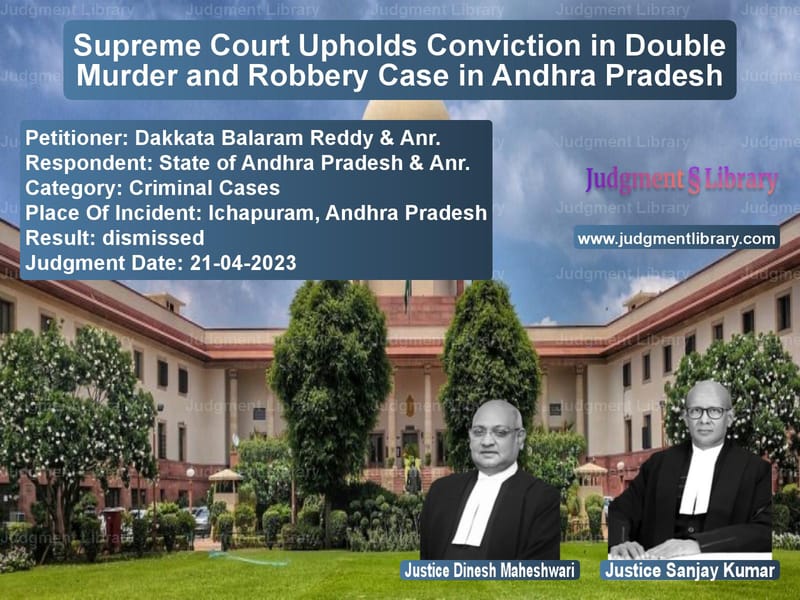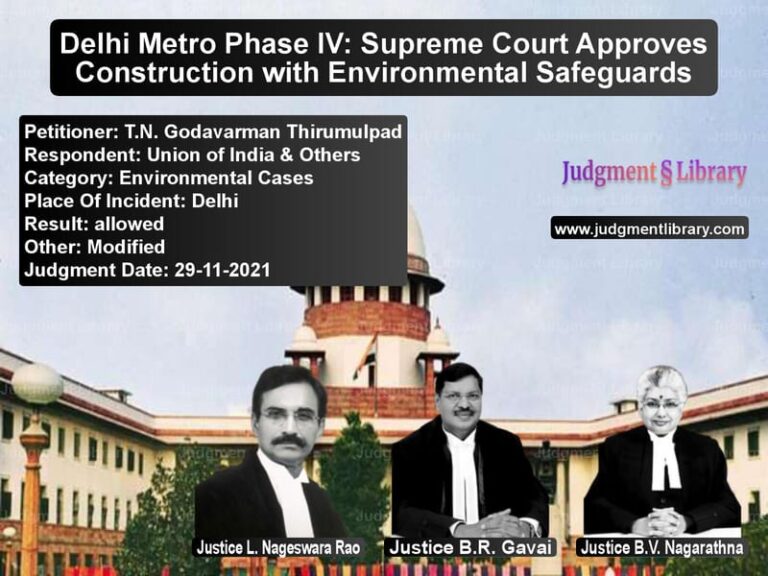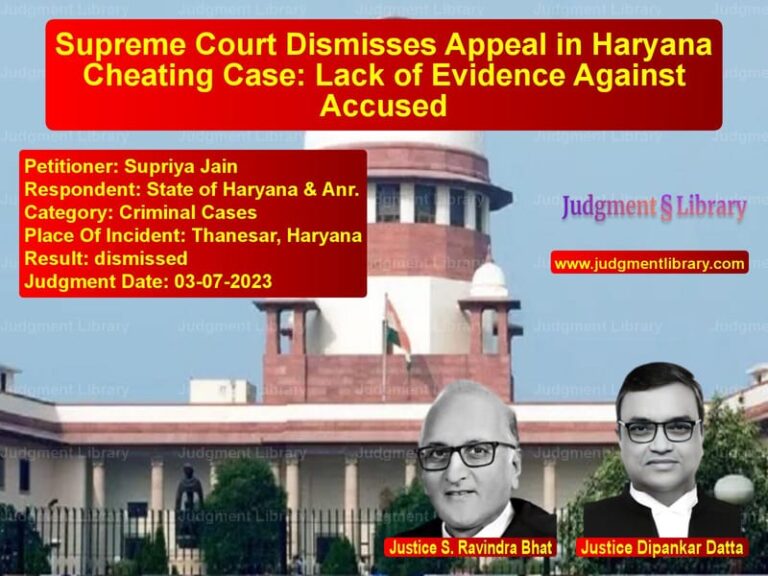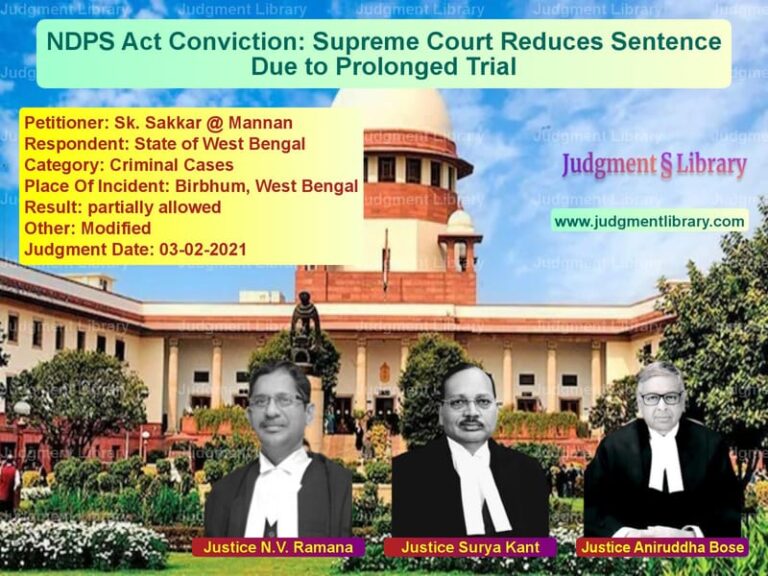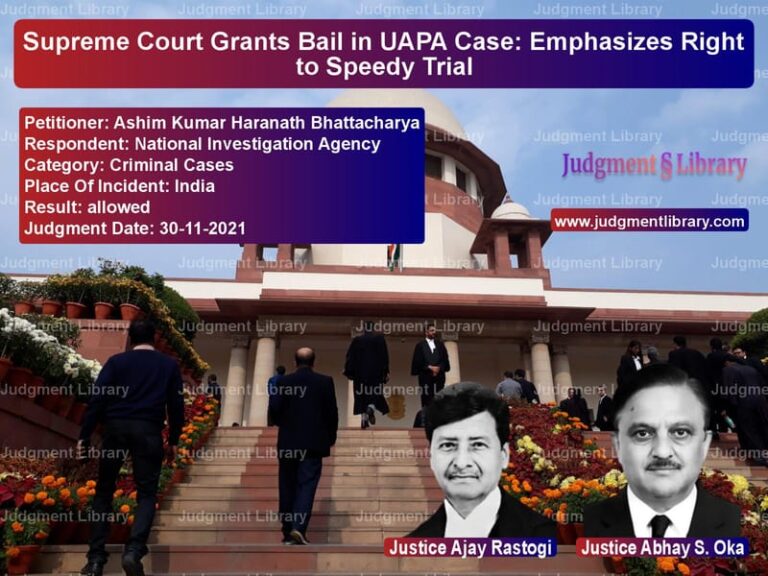Supreme Court Upholds Conviction in Double Murder and Robbery Case in Andhra Pradesh
The Supreme Court of India delivered a crucial judgment in the case of Dakkata Balaram Reddy & Anr. v. State of Andhra Pradesh & Anr., upholding the conviction of the appellants for the brutal murder and robbery of two victims. The case, which was based on circumstantial evidence, involved the killing of a businessman’s wife and son, and the looting of gold ornaments worth approximately 3.5 kg and cash from their house.
The Court examined multiple aspects of the case, including forensic evidence, eyewitness testimony, and procedural lapses. In reaffirming the conviction under Sections 302, 397, and 450 of the Indian Penal Code (IPC), the Court emphasized the reliability of circumstantial evidence when properly established.
Background of the Case
The case originated in Ichapuram, Andhra Pradesh, where the complainant, Vetcha Kesava Rao (PW-1), owned a gold and silver business. On the night of August 21, 2008, his wife and son were brutally murdered, and gold ornaments and cash were looted from their residence.
The primary accused, Dakkata Balaram Reddy (A1) and Chinapana Gopi (A2), were allegedly seen fleeing the crime scene with bags. They were arrested within hours, and stolen gold and cash were recovered from their possession. The prosecution built its case on circumstantial evidence, forensic reports, and witness testimonies.
Trial Court Judgment
The VI Additional District and Sessions Judge, Sompeta, convicted both accused under:
- Section 302 IPC: Imprisonment for life and a fine of ₹2,000 each.
- Section 450 IPC: 10 years’ imprisonment and a fine of ₹2,000 each.
- Section 397 IPC: 7 years’ imprisonment.
The Trial Court relied on:
- Eyewitness testimonies placing the accused at the crime scene.
- Medical evidence confirming homicidal deaths.
- Recovery of stolen property from the accused.
- Forensic reports linking bloodstained weapons to the victims.
High Court Ruling
The accused challenged the verdict before the High Court of Andhra Pradesh, arguing that:
- The case was based entirely on circumstantial evidence.
- The prosecution failed to establish motive conclusively.
- Inconsistencies existed in witness statements.
The High Court dismissed their appeal on October 3, 2018, affirming the trial court’s findings.
Arguments Before the Supreme Court
Arguments by the Appellants
Senior Counsel R. Basant argued that:
- The prosecution failed to establish an unbroken chain of evidence.
- The identification of accused fleeing the scene lacked credibility.
- The forensic evidence did not conclusively link the accused to the crime.
- Procedural lapses in fingerprint collection and witness testimonies cast doubt on the conviction.
State of Andhra Pradesh’s Counterarguments
Learned Counsel Mahfooz Ahsan Nazki argued that:
- Witness testimonies were credible and corroborated by independent sources.
- The forensic evidence, though not sole proof, supported the prosecution’s case.
- Gold recovered from the accused was conclusively linked to the robbery.
- Minor inconsistencies did not weaken the strong circumstantial evidence.
Supreme Court’s Observations
The Supreme Court, in its ruling, emphasized key legal principles governing circumstantial evidence.
Standard of Proof in Circumstantial Evidence
The Court reiterated the principle set in Hanumant Govind Nargundkar v. State of MP (AIR 1952 SC 343), holding that circumstantial evidence must be so conclusive that:
- The chain of evidence must exclude every possibility of innocence.
- The facts established must point only to the accused’s guilt.
- Any hypothesis consistent with innocence must be ruled out.
Validity of Eyewitness Testimonies
Despite minor inconsistencies, the Court found that multiple witnesses corroborated seeing the accused fleeing with bags near the crime scene. The Supreme Court dismissed defense arguments questioning street lighting and visibility.
Forensic and Physical Evidence
While acknowledging flaws in fingerprint collection, the Court noted that:
- Bloodstained iron rods found near the victims were consistent with fatal injuries.
- Stolen gold was recovered from the accused shortly after the crime.
- The recovery of loot from the accused reinforced their involvement.
Judicial Precedents
The Court cited Karnel Singh v. State of MP (1995) 5 SCC 518, which held that minor investigation defects do not justify acquittal unless they cause substantial miscarriage of justice.
Final Judgment
The Supreme Court upheld the convictions, ruling:
- The prosecution established an unbroken chain of circumstantial evidence.
- The testimonies of independent witnesses were reliable.
- The recovery of stolen property further confirmed the accused’s involvement.
- There was no manifest illegality or miscarriage of justice.
The Court dismissed the appeal, affirming the life sentence and additional penalties imposed on the accused.
Key Takeaways from the Judgment
- Circumstantial evidence can be sufficient for conviction if the chain is unbroken.
- Recovery of stolen property from an accused strengthens the prosecution’s case.
- Eyewitness credibility is determined by corroboration, not minor inconsistencies.
- Procedural lapses do not automatically lead to acquittal unless they create reasonable doubt.
Impact of the Ruling
This judgment reinforces principles governing criminal trials in India:
- For Law Enforcement: Ensures rigorous adherence to evidence collection procedures.
- For Judiciary: Sets a precedent for evaluating circumstantial evidence in serious crimes.
- For Public Safety: Strengthens confidence in judicial ability to convict criminals based on well-established evidence.
The ruling highlights the importance of corroborated evidence and procedural fairness while emphasizing that justice should not be derailed by minor discrepancies.
Petitioner Name: Dakkata Balaram Reddy & Anr..Respondent Name: State of Andhra Pradesh & Anr..Judgment By: Justice Dinesh Maheshwari, Justice Sanjay Kumar.Place Of Incident: Ichapuram, Andhra Pradesh.Judgment Date: 21-04-2023.
Don’t miss out on the full details! Download the complete judgment in PDF format below and gain valuable insights instantly!
Download Judgment: dakkata-balaram-redd-vs-state-of-andhra-prad-supreme-court-of-india-judgment-dated-21-04-2023.pdf
Directly Download Judgment: Directly download this Judgment
See all petitions in Murder Cases
See all petitions in Bail and Anticipatory Bail
See all petitions in Fraud and Forgery
See all petitions in Theft and Robbery Cases
See all petitions in Judgment by Dinesh Maheshwari
See all petitions in Judgment by Sanjay Kumar
See all petitions in dismissed
See all petitions in supreme court of India judgments April 2023
See all petitions in 2023 judgments
See all posts in Criminal Cases Category
See all allowed petitions in Criminal Cases Category
See all Dismissed petitions in Criminal Cases Category
See all partially allowed petitions in Criminal Cases Category

